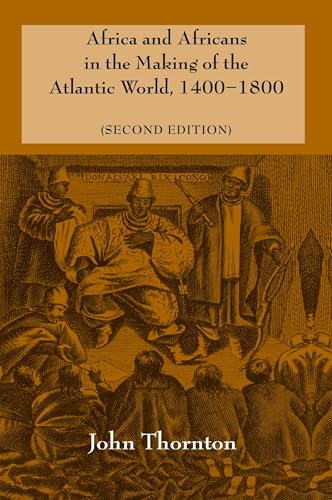Africa and Africans in the Making of the Atlantic World, 1400-1800 (Studies in Comparative World History)
John Thornton
BOOK REVIEW

The intricate dance of history unfolds in Africa and Africans in the Making of the Atlantic World, 1400-1800 by John Thornton. This groundbreaking work is not merely a scholarly exploration; it's an emotional journey into the realms of identity, survival, and the indelible influence of African cultures on the Atlantic world. Through Thornton's lens, the reader is propelled into a vibrant tableau where the threads of Africa intertwine with the burgeoning narratives of the New World.
In an era often marked by Eurocentric histories, Thornton's book defiantly asserts that the story of the Atlantic is incomplete without acknowledging the profound contributions of Africans. This is not just a tale told from the margins; it is the epicenter of a revolution in historical interpretation. As you delve into these pages, you will encounter the resounding echoes of African voices, their customs, beliefs, and resilience that shaped the very foundations of societies across the Atlantic.
At its heart, Thornton's narrative is a powerful reminder that African people were not merely passive victims in the grand drama of the Atlantic slave trade. Instead, they were active agents in their own histories. Picture the bustling ports where goods-both human and material-traversed the ocean. Feel the weight of the captives' hopes and fears as they crossed an ocean that represented both peril and potential. The reader is thrust into the midst of a turbulent period, where the very fabric of the Atlantic world is rebooted by the rich contributions and enduring legacies of African cultures.
This book doesn't shy away from the grim realities of the slave trade but invites you to confront these truths with a heightened sense of empathy and understanding. Thornton meticulously dismantles the monolithic views of African absence from global history, illustrating how the interplay of diverse African societies and their interactions with European traders created a complex web of cultural exchange, conflict, and adaptation.
If you've ever pondered why African diasporas thrive in the Americas, or how African traditions survive against the odds, Thornton's work holds the key to these mysteries. For instance, his discussion on the cultural syncretism evident in religious practices gives life to the idea that African traditions did not simply vanish; they were transformed and integrated into the very fabric of the societies they encountered.
Readers' reactions to Thornton's brilliant analysis range from admiration to critical debate. Some hail it as a pivotal scholarly achievement that reshapes our understanding of race and identity. Others argue it could delve even deeper into the specificities of cultural retention. Yet, it's precisely this discourse that keeps the legacy of Thornton's work alive, urging readers to critically engage with the past and its implications for the present.
Every page of this tome resonates with the pulses of history, urging you to reconsider what you know about the Atlantic world. The synthesis of Thornton's findings has not only influenced scholars but has also reverberated through popular culture, inspiring new narratives in literature, arts, and beyond. Figures like Paul Gilroy and Robin Kelley have drawn from Thornton's insights, propelling discussions about race and identity into new dimensions.
This isn't just an academic book; it's a catalyst for transformation. Engage with it fully, and you will feel the shift in perspective that so many readers have experienced-an awakening to the rich legacies that have shaped our global narrative.
By unraveling the connections between Africa and the Atlantic world, Thornton offers you more than insights; he opens doors to understanding human resilience and unity. As you reflect on the implications of this work, recognize that the struggles and triumphs of African people are not relics of the past but continue to resonate in our contemporary societal structures.
Africa and Africans in the Making of the Atlantic World, 1400-1800 ignites a fiery sense of urgency to delve deeper into our shared histories. The revelations held within its pages challenge you, the reader, to confront your own perceptions of history and identity. Walk away from it not just informed, but transformed-ready to carry forth the narratives that may have been silenced for too long. The emotional and intellectual journey awaits; will you embark on it?
📖 Africa and Africans in the Making of the Atlantic World, 1400-1800 (Studies in Comparative World History)
✍ by John Thornton
🧾 380 pages
1998
#africa #africans #making #atlantic #world #1400 #1800 #studies #comparative #world #history #john #thornton #JohnThornton